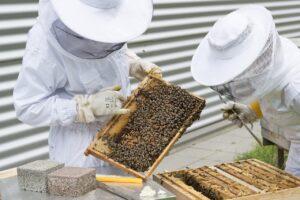Beekeepers: this year’s harvest prospects are good, but the low purchase price is a problem for large honey producers
This year’s acacia season may be favorable for domestic beekeepers, however, as a result of persistently low purchase prices caused by Chinese honey flowing into the European Union – mostly fake – several large domestic honey-producing companies may cease their activities – stated Péter Bross President of the National Hungarian Beekeeping Association (OMME) in an interview with Agroinform.hu.

(Photo: Pixabay)
This year, the generational change took place in the apiaries already by mid-March, the majority of the 1.2 million domestic bee colonies that have overwintered began in good condition. The shoots of the acacia survived the frosty days of March, and with weather similar to the current one, this year’s season of acacia honey can begin at the end of April. Acacia honey is expected to account for more than half of the domestic honey harvest, which is expected to be between 25 and 30 tons this year, the president estimated.
60-70 percent of domestically produced honey is exported, but at the same time, the price of honey in the EU fell by half compared to the beginning of 2022
He pointed out that the collapse of the EU honey market is caused by honey imports from third countries, such as Ukraine, Argentina, and above all from China. According to the results of the honey test conducted by the European Commission last year, three quarters of the samples from Chinese exports proved to be fake, these products practically contained sugar syrup. With this, neither domestic nor other European producers are able to compete on price – Péter Bross pointed out. The market disruptions mainly affect the large market players with at least 200-300 bee colonies, because the smaller players have worked for many years to form their own consumer base, which they can reach through direct sales: at farmers’ markets or through an online webshop. In Hungary, from July 1, it will be mandatory to indicate the countries of origin in the order of composition on the label of honey, for the time being the EU as a whole still has to wait for a similar regulation to be adopted – emphasized Péter Bross. As long as European customers cannot find out about the origin of the products they are consuming, they cannot be expected not to make decisions based on price, he added.
In addition to wheat, milk, eggs and poultry, honey was also included in the EU’s recently created so-called emergency brake regulation. This decree ensures that if any member country can prove that a large amount of Ukrainian products will flow in compared to the year 2022-23 and cause market disruption, then the Union must decide within 14 days on the return of customs duties on the given product – he explained Peter Bross.
MTI
Related news
The government supports the generational renewal of agriculture
🎧 Hallgasd a cikket: Lejátszás Szünet Folytatás Leállítás Nyelv: Auto…
Read more >








